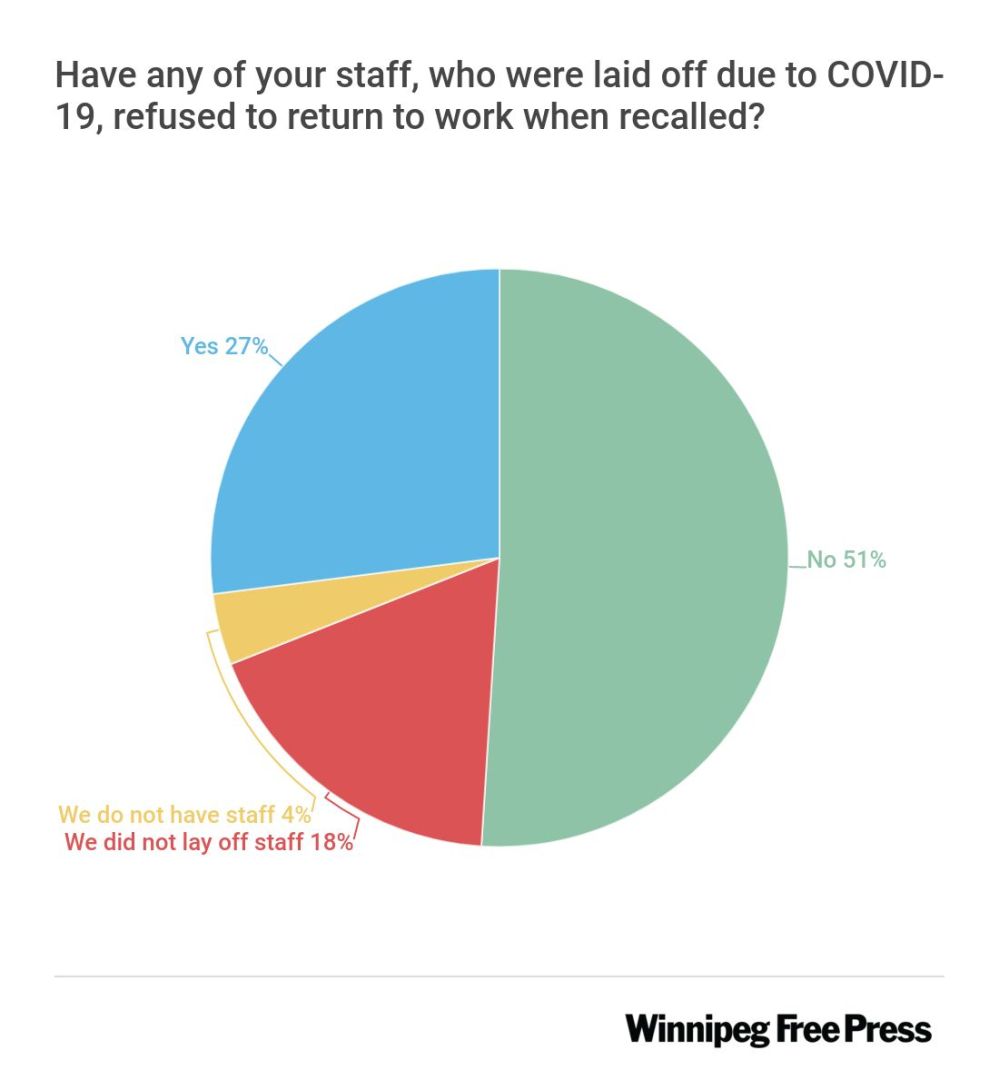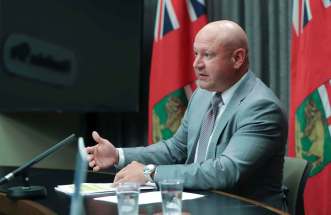Survey says… CERB isn’t small-business bogeyman
Read this article for free:
or
Already have an account? Log in here »
To continue reading, please subscribe:
Monthly Digital Subscription
$0 for the first 4 weeks*
- Enjoy unlimited reading on winnipegfreepress.com
- Read the E-Edition, our digital replica newspaper
- Access News Break, our award-winning app
- Play interactive puzzles
*No charge for 4 weeks then price increases to the regular rate of $19.00 plus GST every four weeks. Offer available to new and qualified returning subscribers only. Cancel any time.
Monthly Digital Subscription
$4.75/week*
- Enjoy unlimited reading on winnipegfreepress.com
- Read the E-Edition, our digital replica newspaper
- Access News Break, our award-winning app
- Play interactive puzzles
*Billed as $19 plus GST every four weeks. Cancel any time.
To continue reading, please subscribe:
Add Free Press access to your Brandon Sun subscription for only an additional
$1 for the first 4 weeks*
*Your next subscription payment will increase by $1.00 and you will be charged $16.99 plus GST for four weeks. After four weeks, your payment will increase to $23.99 plus GST every four weeks.
Read unlimited articles for free today:
or
Already have an account? Log in here »
Hey there, time traveller!
This article was published 16/07/2020 (1977 days ago), so information in it may no longer be current.
Premier Brian Pallister says a new national small-business survey proves what he’s been saying all along: many Manitobans are refusing to return to work in favour of collecting a federal unemployment benefit.
However, the premier either misread the data or got a bad briefing.
“I was pleased today to note that the Canadian Federation of Independent Business released a survey of their members, and noted that 62 per cent of their members have had trouble getting people back to work because of the design of the CERB program,” Pallister said Thursday.
In fact, the survey shows only 27 per cent indicated they had trouble getting laid-off staff to return to work as COVID-19 pandemic restrictions loosen — of that group, 62 per cent cited preferring to stay on the Canada Emergency Response Benefit as the reason.
It’s unclear why the Manitoba premier would be “pleased” about companies having difficulty hiring employees. Perhaps he’s pleased, in his mind, the CFIB survey validates his claims a significant number of people are not returning to work because of the CERB.
The data, however, does not confirm that.
Out of 3,389 CFIB members surveyed, 27 per cent (915) said they were having trouble recalling staff; of those, 62 per cent (567) cited CERB as one of the reasons.
In other words, 17 per cent of small businesses surveyed said they had trouble getting some staff back to work because of the CERB.
There are other reasons: of those who have had staff refuse to return to work, nearly half said people were concerned about their physical health or the health of their family. Just over a quarter cited concerns about child care obligations.
Pallister said his government has no independent data or estimates on what percentage of Manitobans are refusing to return to work because of the CERB. They also have no information on the reasons why.
Some portion of the 17 per cent may be taking advantage of the system and are choosing to take the summer off instead of going back to work (there is anecdotal evidence), but neither the province nor CFIB has any such data.
It raises a lot of questions about the Pallister government’s “job restart” program, where government is paying people up to $2,000 to return to work, even if they were planning to do so anyway. As the economy reopens, thousands of people have already returned to the workforce; in June, 23,600 Manitobans re-entered the labour force.
How does the province know it’s not just giving $2,000 to people who had planned to return to work anyway, without the benefit?
“Certainly, you don’t know, because the economy is restarting,” said Pallister.
Like many programs rushed out the door during the pandemic, from all levels of government, the Manitoba premier said, there’s isn’t the same level of due diligence that would normally go into designing them.
That’s a fair assessment, and the CERB program is a perfect example.
For all its faults, it was necessary to get cash into the hands of Canadians quickly during the sharpest downturn in the economy since the Great Depression. Pallister, who is not advocating the elimination of the CERB, is also right Ottawa should look at updating the program to help incentivize people to get back to work.
His idea of allowing CERB recipients to earn beyond the maximum of $1,000 (by keeping 50 cents of each dollar above that) without losing the entire benefit is not a bad one. Government may also have to help people with child care, or ensure businesses have the resources to make workplaces safer.
But giving anyone who returns to work $2,000 makes little sense if the majority are re-entering the labour force anyway.
It’s bad policy. The money would be better spent helping small businesses and not-for-profits keep their doors open.
Most people want to get back to work, as the CFIB survey shows. Government needs to do more to ensure there’s a place for them to collect a paycheque.
tom.brodbeck@freepress.mb.ca

Tom has been covering Manitoba politics since the early 1990s and joined the Winnipeg Free Press news team in 2019.
Our newsroom depends on a growing audience of readers to power our journalism. If you are not a paid reader, please consider becoming a subscriber.
Our newsroom depends on its audience of readers to power our journalism. Thank you for your support.
History
Updated on Saturday, July 18, 2020 12:18 AM CDT: adds thumbnail

.jpg?w=1000)

.jpg?w=1000)










